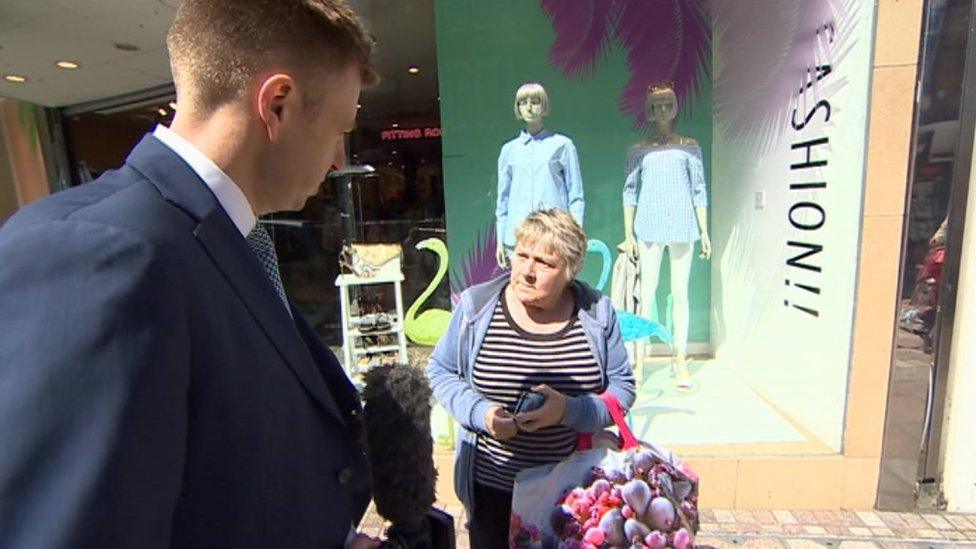General election 2017: All about Brexit?
- Published

Voters here seemed more interested in other matters
Do shoppers at Pontypridd market buy Theresa May's line that this is a Brexit election?
Most I spoke to seemed more concerned by the NHS, even though responsibility for it has been devolved to the assembly since 1999.
Labour wants to focus on domestic policies, so is happy to blur the boundaries of what is and isn't devolved.
References to the Welsh Government's handling of schools and hospitals featured heavily in the launch of the Welsh Labour election campaign. It even reheated promises made at last year's assembly election.
Jeremy Corbyn, however, wasn't mentioned at all in Carwyn Jones's launch speech.
What a contrast with the Conservatives who seize on every opportunity to claim that Theresa May needs to be returned to Downing Street so she can lead the UK out of the EU.
For the Tories, this is the Brexit election.
And the polls suggest a lot of voters agree.
YouGov, on behalf of ITV Wales, has been asking people to rank the political issues that matter to them.
Its survey of more than 1,000 people is a much better guide to public opinion than the half-dozen willing to talk to me in Ponty.
The EU - or rather leaving it - has shot up the list of priorities.
For years, Europe ranked way behind the health service and the economy.
But the referendum has changed that.

Europe has never been the main topic in a general election campaign before, says Roger Scully
Polling expert Prof Roger Scully, of Cardiff University, said: "You would normally expect maybe the economy to come top, the health service to be second.
"This time it's Brexit - and clearly Brexit.
"And that's unprecedented. We've never had a general election before where Brexit or the EU or relations with Europe have been the most important issue."
So if this is the Brexit election, is Mrs May right to say voting for her will improve Brexit by strengthening her hand in the negotiations?
A report in the German newspaper Frankfurter Allgemeine Zeitung said those negotiations began badly at a dinner with European Commission president Jean-Claude Juncker.

Theresa May's majority will not affect the EU's negotiating stance, says Thomas Gutschker
The journalist who broke the story, Thomas Gutschker, has been asking his contacts in Brussels and Berlin whether they care about the size of Mrs May's majority in the House of Commons.
He said: "They don't care about the size in the sense that she implies it - that she might have a stronger hand in the negotiations with a stronger majority.
"They do care however about this majority because they think the bigger it is the easier it will be for her to sideline Brexit hardliners in her own party, and then really to strike the difficult compromise that needs to be struck."
The EU has already set out its negotiating position, Mr Gutschker added.
"It won't make any difference neither for politicians in Brussels nor in Berlin whether this government has a 50-seat majority or a 100-seat majority in the House of Commons."
It's worth reflecting on how the topics that dominated the 2015 election seem to have vanished.
The Tories have got rid of a target to generate a surplus by 2020.
David Cameron and George Osborne aren't even standing.
And who would have thought two years ago that Jeremy Corbyn would be Labour's candidate for the job of prime minister?
The referendum changed the political landscape and the personnel.